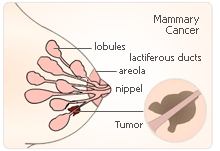
Breast cancer is often caused by an imbalance of hormones in the body, particularly the progesterone hormone. This is a hormone-dependent type of cancer - which means that the progesterone hormone stimulates cancer growth by turning on the receptors in the cancer cells. The progesterone hormone stimulates both normal and abnormal breast cell growth for women in the premenopause stage. The 2009 study by Heather A. Eliassen et al. explores the link between breast cancer, aspirin use and the progesterone hormone for women going through premenopause. The full title of the study is: “Use of Aspirin, Other Nonsteroidal Anti-inflammatory Drugs, and Acetaminophen and Risk of Breast Cancer Among Premenopausal Women in the Nurses' Health Study II.”
Aspirin and other nonsteroidal anti-inflammatory drugs (NSAIDs) have long been use to treat minor symptoms such as inflammation, headaches and muscular pain for women at the premenopause stage. The use of NSAIDs for colon cancer and heart disease has also become increasingly prevalent. Little data exists to support claims of NSAIDs protective role against breast cancer for women, whether they be in premenopause or postmenopause stage. In particular, few studies has been done on whether or not NSAIDs have any effect on controlling the progesterone hormone in premenopause women.
progesterone tumor

The risk for breast cancer and unbalanced progesterone hormone levels among women who were still at the premenopause stage and using NSAIDS was assessed through the nurse's study. Overall, a little more than 110,000 women in the premenopause stage between the ages of 25 to 42 years old were assessed. 1,345 cases of breast cancer was documented among these premenopause women. Every two years, the women were assessed for premenopause status through a questionnaire.
Aspirins/NSAIDS were hypothesized to possibly reduce their risk of breast cancer because it inhibits the cyclo-oxygenase enzyme 2 (COX-2) pathway. The inhibition may decrease the carcinogens in the body by decreasing proliferation. Elevated levels of COX-2 may play a specific role in breast cancer since they have been observed in breast tumor tissue. Conversely, medication that inhibits the growth of COX-2 has been shown to decrease activity in breast cancer cells, which slows their spread. Strong evidence in previous experimental studies led the authors of this study to believe that there might be a possibility.
In conclusion, the study found that regular use of aspirin by premenopause women did not significantly lower the risk for breast cancer. There was no relationship between risk for breast cancer and progesterone hormone imbalance with frequency, dosage or duration of aspirin use. Results from other studies have been mixed. More studies are needed.